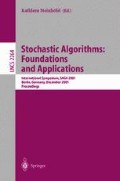Abstract
Recently, we have developed a learning model, called stochastic finite learning, that makes a connection between concepts from PAC learning and inductive inference learning models. The motivation for this work is as follows. Within Gold’s (1967) model of learning in the limit many important learning problems can be formalized and it can be shown that they are algorithmically solvable in principle. However, since a limit learner is only supposed to converge, one never knows at any particular learning stage whether or not it has already been successful. Such an uncertainty may be not acceptable in many applications. The present paper surveys the new approach to overcome this uncertainty that potentially has a wide range of applicability.
Access this chapter
Tax calculation will be finalised at checkout
Purchases are for personal use only
Preview
Unable to display preview. Download preview PDF.
References
D. Angluin, Finding Patterns common to a Set of Strings, Journal of Computer and System Sciences 21 (1980), 46–62.
A. Blumer, A. Ehrenfeucht, D. Haussler and M. Warmuth, Learnability and the Vapnik-Chervonenkis Dimension, Journal of the ACM 36 (1989), 929–965.
J. Case, S. Jain, S. Lange and T. Zeugmann, Incremental Concept Learning for Bounded Data Mining, Information and Computation 152, No. 1, 1999, 74–110.
R. Daley and C.H. Smith. On the Complexity of Inductive Inference. Information and Control 69 (1986), 12–40.
T. Erlebach, P. Rossmanith, H. Stadtherr, A. Steger and T. Zeugmann, Learning one-variable pattern languages very efficiently on average, in parallel, and by asking queries, Theoretical Computer Science 261, No. 1–2, 2001, 119–156.
E.M. Gold, Language identification in the limit, Information and Control 10 (1967), 447–474.
S.A. Goldman, M.J. Kearns and R.E. Schapire, Exact identification of circuits using fixed points of amplification functions. SIAM Journal of Computing 22, 1993, 705–726.
D. Haussler, Bias, version spaces and Valiant’s learning framework. “Proc. 8th National Conference on Artificial Intelligence” (pp. 564–569). Morgan Kaufmann, 1987.
D. Haussler, M. Kearns, N. Littlestone and M.K. Warmuth, Equivalence of models for polynomial learnability. Information and Computation 95 (1991), 129–161.
M. Kearns L. Pitt, A polynomial-time algorithm for learning k-variable pattern languages from examples. “Proc. Second Annual ACM Workshop on Computational Learning Theory” (pp. 57–71). Morgan Kaufmann, 1989.
S. Lange and R. Wiehagen, Polynomial-time inference of arbitrary pattern languages. New Generation Computing 8 (1991), 361–370.
S. Lange and T. Zeugmann, Set-driven and Rearrangement-independent Learning of Recursive Languages, Mathematical Systems Theory 29 (1996), 599–634.
S. Lange and T. Zeugmann, Incremental Learning from Positive Data, Journal of Computer and System Sciences 53(1996), 88–103.
A. Mitchell, A. Sharma, T. Scheffer and F. Stephan, The VC-dimension of Subclasses of Pattern Languages, in “Proc. 10th International Conference on Algorithmic Learning Theory,” (O. Watanabe and T. Yokomori, Eds.), Lecture Notes in Artificial Intelligence, Vol. 1720, pp. 93–105, Springer-Verlag, Berlin, 1999.
L. Pitt, Inductive Inference, DFAs and Computational Complexity, in “Proc. 2nd Int. Workshop on Analogical and Inductive Inference” (K.P. Jantke, Ed.), Lecture Notes in Artificial Intelligence, Vol. 397, pp. 18–44, Springer-Verlag, Berlin, 1989.
R. Reischuk and T. Zeugmann, Learning One-Variable Pattern Languages in Linear Average Time, in “Proc. 11th Annual Conference on Computational Learning Theory-COLT’98,” July 24th–26th, Madison, pp. 198–208, ACM Press 1998.
R. Reischuk and T. Zeugmann, A Complete and Tight Average-Case Analysis of Learning Monomials, in “Proc. 16th International Symposium on Theoretical Aspects of Computer Science,” (C. Meinel and S. Tison, Eds.), Lecture Notes in Computer Science, Vol. 1563, pp. 414–423, Springer-Verlag, Berlin 1999.
R. Reischuk and T. Zeugmann, An Average-Case Optimal One-Variable Pattern Language Learner, Journal of Computer and System Sciences 60, No. 2, 2000, 302–335.
P. Rossmanith and T. Zeugmann. Stochastic Finite Learning of the Pattern Languages, Machine Learning 44, No. 1–2, 2001, 67–91.
L.G. Valiant, A Theory of the Learnable, Communications of the ACM 27 (1984), 1134–1142.
R. Wiehagen and T. Zeugmann, Ignoring Data may be the only Way to Learn Efficiently, Journal of Experimental and Theoretical Artificial Intelligence 6 (1994), 131–144.
T. Zeugmann, Lange and Wiehagen’s Pattern Language Learning Algorithm: An Average-case Analysis with respect to its Total Learning Time, Annals of Mathematics and Artificial Intelligence 23, No. 1–2, 1998, 117–145.
Author information
Authors and Affiliations
Editor information
Editors and Affiliations
Rights and permissions
Copyright information
© 2001 Springer-Verlag Berlin Heidelberg
About this paper
Cite this paper
Zeugmann, T. (2001). Stochastic Finite Learning. In: Steinhöfel, K. (eds) Stochastic Algorithms: Foundations and Applications. SAGA 2001. Lecture Notes in Computer Science, vol 2264. Springer, Berlin, Heidelberg. https://doi.org/10.1007/3-540-45322-9_11
Download citation
DOI: https://doi.org/10.1007/3-540-45322-9_11
Published:
Publisher Name: Springer, Berlin, Heidelberg
Print ISBN: 978-3-540-43025-4
Online ISBN: 978-3-540-45322-2
eBook Packages: Springer Book Archive

